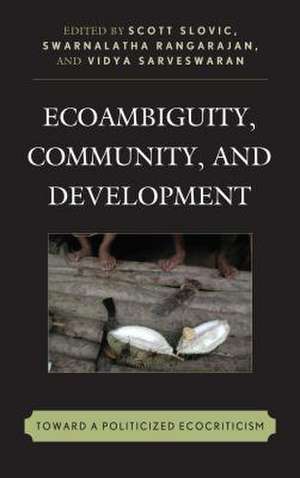Ecoambiguity, Community, and Development: Ecocritical Theory and Practice
en Limba Engleză Paperback – 16 oct 2015
| Toate formatele și edițiile | Preț | Express |
|---|---|---|
| Paperback (1) | 429.86 lei 6-8 săpt. | |
| Rowman & Littlefield – 16 oct 2015 | 429.86 lei 6-8 săpt. | |
| Hardback (1) | 700.68 lei 6-8 săpt. | |
| Rowman & Littlefield – 28 feb 2014 | 700.68 lei 6-8 săpt. |
Din seria Ecocritical Theory and Practice
-
 Preț: 247.51 lei
Preț: 247.51 lei -
 Preț: 204.74 lei
Preț: 204.74 lei - 23%
 Preț: 687.32 lei
Preț: 687.32 lei - 27%
 Preț: 714.87 lei
Preț: 714.87 lei -
 Preț: 394.77 lei
Preț: 394.77 lei - 23%
 Preț: 685.09 lei
Preț: 685.09 lei -
 Preț: 425.95 lei
Preț: 425.95 lei - 27%
 Preț: 717.26 lei
Preț: 717.26 lei - 27%
 Preț: 794.48 lei
Preț: 794.48 lei -
 Preț: 454.03 lei
Preț: 454.03 lei - 23%
 Preț: 686.27 lei
Preț: 686.27 lei - 27%
 Preț: 681.83 lei
Preț: 681.83 lei -
 Preț: 474.34 lei
Preț: 474.34 lei - 23%
 Preț: 647.46 lei
Preț: 647.46 lei - 27%
 Preț: 715.54 lei
Preț: 715.54 lei - 27%
 Preț: 788.38 lei
Preț: 788.38 lei - 23%
 Preț: 649.09 lei
Preț: 649.09 lei -
 Preț: 398.63 lei
Preț: 398.63 lei -
 Preț: 397.45 lei
Preț: 397.45 lei - 23%
 Preț: 648.64 lei
Preț: 648.64 lei - 27%
 Preț: 761.68 lei
Preț: 761.68 lei - 27%
 Preț: 756.23 lei
Preț: 756.23 lei - 27%
 Preț: 740.63 lei
Preț: 740.63 lei -
 Preț: 432.81 lei
Preț: 432.81 lei - 23%
 Preț: 657.77 lei
Preț: 657.77 lei -
 Preț: 449.53 lei
Preț: 449.53 lei - 23%
 Preț: 682.88 lei
Preț: 682.88 lei - 23%
 Preț: 605.56 lei
Preț: 605.56 lei - 23%
 Preț: 648.80 lei
Preț: 648.80 lei - 27%
 Preț: 683.94 lei
Preț: 683.94 lei - 23%
 Preț: 683.62 lei
Preț: 683.62 lei - 23%
 Preț: 649.68 lei
Preț: 649.68 lei -
 Preț: 399.79 lei
Preț: 399.79 lei -
 Preț: 455.30 lei
Preț: 455.30 lei -
 Preț: 427.91 lei
Preț: 427.91 lei - 27%
 Preț: 756.78 lei
Preț: 756.78 lei - 23%
 Preț: 683.76 lei
Preț: 683.76 lei - 23%
 Preț: 685.09 lei
Preț: 685.09 lei -
 Preț: 399.79 lei
Preț: 399.79 lei -
 Preț: 467.34 lei
Preț: 467.34 lei - 27%
 Preț: 671.06 lei
Preț: 671.06 lei -
 Preț: 363.35 lei
Preț: 363.35 lei - 23%
 Preț: 679.19 lei
Preț: 679.19 lei -
 Preț: 487.41 lei
Preț: 487.41 lei - 27%
 Preț: 715.54 lei
Preț: 715.54 lei - 23%
 Preț: 699.93 lei
Preț: 699.93 lei - 27%
 Preț: 790.95 lei
Preț: 790.95 lei
Preț: 429.86 lei
Preț vechi: 558.25 lei
-23% Nou
Puncte Express: 645
Preț estimativ în valută:
82.26€ • 85.57$ • 67.91£
82.26€ • 85.57$ • 67.91£
Carte tipărită la comandă
Livrare economică 14-28 aprilie
Preluare comenzi: 021 569.72.76
Specificații
ISBN-13: 9781498525367
ISBN-10: 1498525369
Pagini: 214
Dimensiuni: 150 x 226 x 15 mm
Greutate: 0.34 kg
Editura: Rowman & Littlefield
Seria Ecocritical Theory and Practice
ISBN-10: 1498525369
Pagini: 214
Dimensiuni: 150 x 226 x 15 mm
Greutate: 0.34 kg
Editura: Rowman & Littlefield
Seria Ecocritical Theory and Practice
Notă biografică
Cuprins
Table of Contents
Introduction Scott Slovic, Swarnalatha Rangarajan, and Vidya Sarveswaran
Chapter 1: Plundering Borderlands North and South Karen Thornber
Chapter 2: Tibet, a Topos in Ecopolitics of the Global South Gang Yue
Chapter 3: Red China, Green Amnesia: Locating Environmental Justice in Contemporary Chinese Literature Cheng Li and Yanjun Liu
Chapter 4: Minamata and the Symbolic Discourse of the South Tsutomu Takahashi
Chapter 5: Indian Environmentalism and Its Fragments Jyotirmaya Tripathy
Chapter 6: From Bhopal to Biometrics: Biological Citizenship in the Age of Globalization Pamod Nayar
Chapter 7: Beyond the Eco-flaneur¿s Footsteps: Perambulatory Narration in Zakes Mdäs Ways of Dying Laura A. White
Chapter 8: Reconsidering the Eco-Imperatives of Ukrainian Consciousness: An Introduction to Ukrainian Environmental Literature Inna Sukhenko
Chapter 9: Kissed by Lightning and Fourth Cinemäs Natureculture Continuum Salma Monani
Chapter 10: Under all the laws, natural, human, and divine: Reinterpreting La Leyenda Negräs Colonial Purpose Dora Ramirez-Dhoore
Chapter 11: Mapmaking, Rubbertapping: Cartography and Social Ecology in Euclides da Cunhäs The Amazon: Land Without History Aarti Madan
Chapter 12: Down Under: New World Literatures and Ecocriticism George B. Handley
Index
Contributors
Descriere
Ecoambiguity, Community, and Development extends the energetic and socially important tradition of postcolonial ecocriticism to regions of the world not normally considered in the postcolonial context, such as southern Japan and eastern Europe. The text expands Karen Thornber's notion of "ecoambiguity" from her own work on East Asian literature and culture to many other countries.
